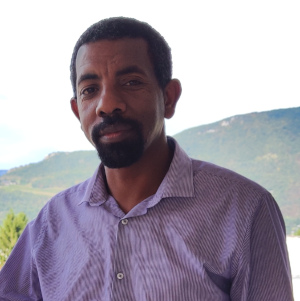- Share
- Share on Facebook
- Share on X
- Share on LinkedIn

Alebachew BIRRU
got his PhD from the University of Toulouse, France in 2020. Since then, he has been serving as an Assistant Professor of Archaeology and Heritage Studies at Debre Berhan University (DBU), Ethiopia. He also served as an Associate Dean of the Office of Internationalization and Partnerships of DBU. He was a fellow at the Harvard University Center for Italian Renaissance Studies (ITATTI), Florence, Italy in 2023. He has also been a 2023/24 AfOx fellow of the University of Oxford, UK. His particular area of research focuses on the archaeology and History of the Central Highlands of Ethiopia from the 10th to the 16th century.
Project at the MaCI
September 2024 - June 2025
The project traces the role that the exchange of sacred objects played in the millennia-long history of entanglement between the Horn of Africa and the Mediterranean World (c. 4th to 16th c.). This ancient-rooted networks did have not only a religious role but rather encompassed political and economic interests. Investigating the manifestation of this historical process in the material culture is the prime focus of the project. Since antiquity, Ethiopian kings minted coins for international trade use, excavated churches from rocks, commissioned the building and consecration of churches dedicated to the different Christian holy figures, etc. Meanwhile, there were “pagan” and Islamic establishments, earlier, latter and at times parallel to the christian kingdoms. All these groups were onboard in the contemporary intra- and inter-regional trading networks. These commercial links used overland and over sea paths to the Mediterranean Sea and Indian Ocean Worlds. In this cases, overland routes along the Nile and the Red Sea were major connectors to the world outside of the Horn. Likewise, there are contemporary and later sacred material traces of the same kind in many places in the Mediterranean and Indian Ocean Worlds. However, no attempt has yet been made to look into the archaeological and historical evidence to better grasp the place that sacred objects had in the multi-purpose relations of the different politico-religious entities during the late antique and the medieval period. Hence, the project targets to explore the multi-confessional environment that prevailed in the Horn of Africa during the medieval period as part of a wider set of trans-regional and global patterns, not as a separate and isolated entity confined to East Africa. The study involves investigation into the current inquiries and conceptual debates in the field of the “Global Middle Ages”. Through the use of archaeological, art & architectural, philological and historical evidence the researcher substantiates networks that existed for over a millennial between the multi-cultural world of the Horn of Africa and the world outside during the period under consideration.
The motives and objectives behind joining the very interactive environment in humanities, MACI are to further pursue the projects on the mobility of sacred objects that the researcher run and have been running at I Tatti and Oxford (under the AfOx program) respectively. To get sufficient time and access to resources to publish project outcomes progressively in various possible ways. To broaden the network that the researcher and his home university (DBU) have with scholars in the field of humanities present at MACI and Université Grenoble Alpes at large.
‘I feel very lucky to be part of this internationally competitive excellence in Humanities program, and I’m dedicated to fulfil my part towards the achievement of GATES goals.’
Activities
- 6 December 2024 - Conference Forum for Medieval Studies in Ethiopia and the Horn - Hybrid presentation
Funded by the French government's Programme d'Investissement Avenir and implemented by ANR France 2030
CONTACTS / Websites
X: @Alebach04397513 / @FfMSEH
Linkedin: https:/www.linkedin.com/in/dr-alebachew-belay-birru-56703229/
Facebook: https://www.facebook.com/alebachew.belay
Website: https://www.medievalhorn.com/
- Share
- Share on Facebook
- Share on X
- Share on LinkedIn
